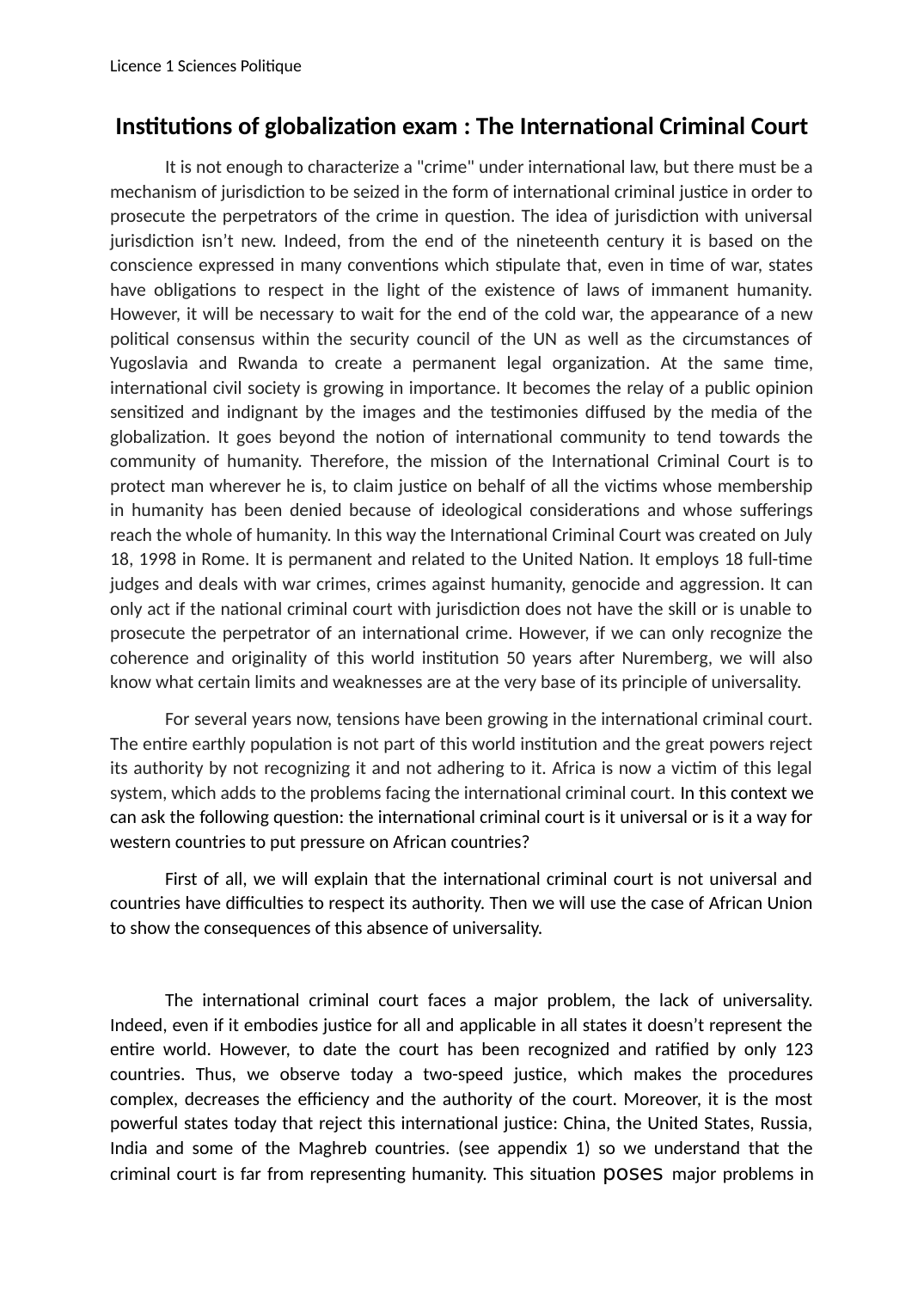Understanding of International organizations
Publié le 16/02/2021

Extrait du document
«
Licence 1 Sciences Politique
Institutions of globalization exam : The International Criminal Court
It is not enough to characterize a "crime" under international law, but there must be a
mechanism of jurisdiction to be seized in the form of international criminal justice in order to
prosecute the perpetrators of the crime in question.
The idea of jurisdiction with universal
jurisdiction isn’t new.
Indeed, from the end of the nineteenth century it is based on the
conscience expressed in many conventions which stipulate that, even in time of war, states
have obligations to respect in the light of the existence of laws of immanent humanity.
However, it will be necessary to wait for the end of the cold war, the appearance of a new
political consensus within the security council of the UN as well as the circumstances of
Yugoslavia and Rwanda to create a permanent legal organization.
At the same time,
international civil society is growing in importance.
It becomes the relay of a public opinion
sensitized and indignant by the images and the testimonies diffused by the media of the
globalization.
It goes beyond the notion of international community to tend towards the
community of humanity.
Therefore, the mission of the International Criminal Court is to
protect man wherever he is, to claim justice on behalf of all the victims whose membership
in humanity has been denied because of ideological considerations and whose sufferings
reach the whole of humanity.
In this way the International Criminal Court was created on July
18, 1998 in Rome.
It is permanent and related to the United Nation.
It employs 18 full-time
judges and deals with war crimes, crimes against humanity, genocide and aggression.
It can
only act if the national criminal court with jurisdiction does not have the skill or is unable to
prosecute the perpetrator of an international crime.
However, if we can only recognize the
coherence and originality of this world institution 50 years after Nuremberg, we will also
know what certain limits and weaknesses are at the very base of its principle of universality.
For several years now, tensions have been growing in the international criminal court.
The entire earthly population is not part of this world institution and the great powers reject
its authority by not recognizing it and not adhering to it.
Africa is now a victim of this legal
system, which adds to the problems facing the international criminal court.
In this context we
can ask the following question: the international criminal court is it universal or is it a way for
western countries to put pressure on African countries?
First of all, we will explain that the international criminal court is not universal and
countries have difficulties to respect its authority.
Then we will use the case of African Union
to show the consequences of this absence of universality.
The international criminal court faces a major problem, the lack of universality.
Indeed, even if it embodies justice for all and applicable in all states it doesn’t represent the
entire world.
However, to date the court has been recognized and ratified by only 123
countries.
Thus, we observe today a two-speed justice, which makes the procedures
complex, decreases the efficiency and the authority of the court.
Moreover, it is the most
powerful states today that reject this international justice: China, the United States, Russia,
India and some of the Maghreb countries.
(see appendix 1) so we understand that the
criminal court is far from representing humanity.
This situation poses major problems in.
»
↓↓↓ APERÇU DU DOCUMENT ↓↓↓
Liens utiles
- Les effets du protectionnisme Etats-Unien sur le commerce international
- Tribunal pénal international pour l'ex-Yougoslavie
- Résumé cours commerce international - SES
- Moidroit international
- Chapitre 4 : Quels sont les fondements du commerce international et de l’internationalisation de la production ?


